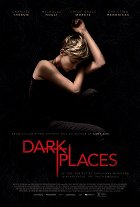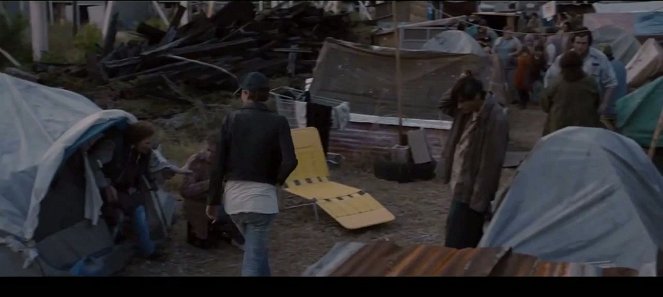Directed by:
Gilles Paquet-BrennerScreenplay:
Gilles Paquet-BrennerCinematography:
Barry AckroydCast:
Charlize Theron, Nicholas Hoult, Christina Hendricks, Corey Stoll, Tye Sheridan, Chloë Grace Moretz, Andrea Roth, Sterling Jerins, Sean Bridgers (more)VOD (3)
Plots(1)
Libby Day (Charlize Theron) was only seven years old when her mother and two sisters were brutally murdered in their rural Kansas farmhouse. In court, the traumatized child pointed the finger at her brother, Ben (Tye Sheridan), and her testimony put the troubled 16-year-old in prison for life. Twenty-five years later, a broke and desperate Libby has run through donations from a sympathetic public and royalties from her sensational autobiography, without ever moving past the events of that night.
When Libby accepts a fee to appear at a gathering of true-crime aficionados led by Lyle Wirth (Nicholas Hoult), she is shocked to learn most of them believe Ben is innocent and the real killer is still at large. In need of money, she reluctantly agrees to help them reexamine the crime by revisiting the worst moments of her life. But as Libby and Lyle dig deeper into the circumstances surrounding the murders, her recollections start to unravel and she is forced to question exactly what she saw -- or didn't see. Aslong-buried memories resurface, Libby begins to confront the wrenching truths that led up to that horrific night. Also starring Christina Hendricks, Corey Stoll and Chloë Grace Moretz, Dark Places is an ingeniously twisted thriller based on the best-selling novel by Gillian Flynn (Gone Girl).
(A24)
Reviews (5)
You know those top-shelf movies that, despite a stellar cast, don’t make it into cinemas and end up on DVD/Blu-ray? Dark Places is a movie that would deserve such a fate, even though that wasn’t the case. It’s a TV-like drama about a family tragedy that does not work at all with the tension or atmosphere of the environment and does nothing but pile up dialogue scenes that unearth an unoriginal and uninteresting story. Uninteresting at least given the fact that it’s an American thriller with Charlize Theron. Her acting is great, but she should leave the production craft to others. A good book is not everything, equally or more important is the director who gives the story its character, mood and visuals.
()
Rated in comparison with Gone Girl, which in book form was different in genre and form, Dark Corners is a total fiasco. Even if we overlook the name and reputation of the author (who didn’t write the screenplay this time, but only gave the director her blessing, whatever that’s supposed to mean), it’s still a disappointment. The source material had already “dramaturgically” suffered from an overabundance of narrators, which served to form a complex, fully non-nostalgic portrait of rural America in the 1980s (where amorality and violence could be seen not only as a means of escaping from poverty, but also as a metaphor for the demise of the local agrarian way of life). However, four hundred pages of text is not the same as one hundred minutes of film. Dark Corners is rushed and agitated, with no atmosphere or suspense. Though starting the film with a murder promises a detective story, at the end of which the killer will be revealed, the investigation is too predictable and tedious to arouse our curiosity or to leave space for us to get involved in the investigation ourselves. The numerous flashbacks rarely add to the detective storyline, nor do they raise or answer questions about the identity of the killer; rather, they tell us in advance what Libby will learn from the next witness she visits. In short, they are redundant. Gathering and assessing information are set aside in favour of Libby’s character transformation as she changes from a passive woman who based her “career” on the assigned label of victim into an active woman who takes actions more or less without the help of men (in the book, Lyle is even more of a burden). Charlize Theron impressively (and with restraint) portrays this transformation, but because of the constant jumps in time, we don’t spend enough time with Libby to get into her inner world as thoroughly as we do in the book, which works much more with the heroine’s cynical commentary and does it better. The alternating between empathetic character study and reserved crime thriller causes the film to fail on both genre levels. Equally lacking in concept (or out of tune with the director’s concept) is the work of Greengrass’s cinematographer, Barry Ackroyd. Though he manages to accentuate the bleakness of the plot with the right lighting and muted colours, he applies a raw documentary style (shaky handheld camera, zooming) even in scenes where a calming effect would be desirable and where making it obvious that someone is holding the camera and spontaneously reacting to the action only draws attention away from the dialogue. Similar doubts are raised by the work with colour in relation to various flashbacks. Whereas grainy black-and-white is justifiable in the memories of the murder, which are very reminiscent of a semi-amateur 1980s horror movie on an often-watched VHS tape, why are the memories of other characters and memories that are supposed to be objective filmed in black-and-white (though no longer grainy), but the flashbacks tied to the point of view of Patty and Ben are not? Whereas the director turned the often caustic and brutal novel into a restrained, slightly sentimental psychological drama, the cinematographer understood it as a variation on Capote’s groundbreaking true-crime novel In Cold Blood. Because of that, the viewer is best served by reaching for the book instead of going to the cinema. 55%
()
(less)
(more)
If the director was not narrating this properly gloomy crime film in such a clumsy way, I would have been utterly excited. But still, Charlize Theron again shows a good performance of a woman with a destiny similar to a snail on the road and I have to admit she was the reason why I watched the whole film till the end. The gradual uncovering of the plot then caused a real excitement about the finale, which amazingly broke some sort of resolution into the darkness-soaked story.
()
I kept telling myself the whole time I'd much rather read it, because as a movie this is pretty boring. Mainly because Libby is basically an asshole and I more or less didn't care what happened to her thirty years ago. The actors are great without exception, but when the whole thing is incredibly drawn out, long and cold, it can't be enough. Gilles Paquet-Brenner can't build tension, though there are obviously moments when he could and when it probably worked in the book (the scenes with the father), but from the halfway point on I was more or less just waiting for it to end to see if there was some major twist that would make the previous hour of tedium look brilliant. I didn't notice any.
()
This story has quite good characters and manages to keep you in suspense, because you keep wondering what actually happened. That the main heroine killed someone due to some amnesty? In the end, the finale is quite well executed and I think it is surprising and functional in terms of the screenplay. However, at times it does lose its breath and I got a little bored. There are scenes here that are not important for the resolution and only prolong the plot.
()

